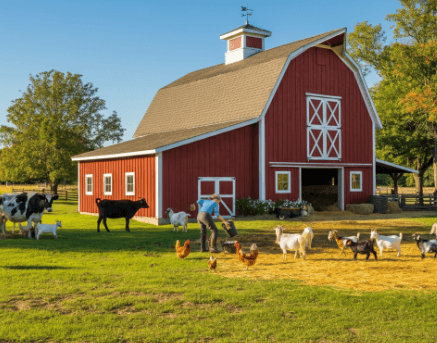Building a barn on your land is a thrilling project designed to elevate both the value and functionality of your property. Did you know the cost of building a barn in the U.S. typically falls between $10,000 and $50,000? The final cost depends on factors such as size and material choice. Proper planning is crucial for staying within budget and creating a barn that meets your specific needs. Before breaking ground, it’s essential to consider several key factors, from selecting the perfect location to navigating zoning regulations. Steve Daria and Joleigh, renowned real estate investors and cash land buyers, emphasize the importance of designing a barn that fits both your property and your long-term goals. Whether you’re building a barn on your land for farming, storage, or livestock, their expert advice can help you avoid costly mistakes. Ready to get started? Book a free discussion with Steve and Joleigh today to learn how to maximize your property’s potential and make your barn-building project a success. Don’t wait—turn your vision into reality with the right guidance and support!
What are the benefits of building a barn on your land?
Building a barn on your land offers various benefits that improve the functionality and increase the value of your property.
A barn provides a dedicated space for storing equipment, tools, or vehicles, keeping them safe from weather and theft.
If you’re into farming or raising animals, a barn offers a secure and organized area for livestock, feed, and supplies.

It can double as a workshop or hobby space, offering a dedicated area to pursue your projects without adding clutter to your home.
Additionally, barns can increase the resale value of your property, as they are often seen as a valuable asset by potential buyers.
They also allow you to customize the space to fit your specific needs, whether it’s for agricultural use, storage, or even a recreational area.
Building a barn on your land can also save you money in the long run by reducing the need for off-site storage rentals.
A well-designed and thoughtfully planned barn can serve as a versatile, durable, and valuable addition to your property.
It’s a practical investment that offers both immediate and long-term benefits.
Get Started: Get Your Cash Offer Below…
We are direct land buyers. There are no commissions or fees and no obligation whatsoever. Start below by sharing where your property is and where we can send your offer…
How much does it typically cost to build a barn?
The cost of constructing a barn can vary widely based on key factors such as its size, the materials used, and the location of the build.
On average, building a barn on your land can cost anywhere from $10,000 to $50,000.
Smaller, simpler barns made of basic materials, such as wood or metal, are on the lower end of the price range.
Larger barns with custom designs, high-quality materials, or added features like insulation and electricity can cost significantly more.
Labor costs are a key factor to consider, particularly when opting to hire a contractor rather than taking a do-it-yourself approach.
Additionally, you’ll need to account for permits, land preparation, and utility connections, as these can significantly contribute to the overall cost.
If you’re planning to use the barn for livestock, you may also need to invest in specialized equipment or fencing.
It’s essential to obtain multiple quotes and plan your budget carefully to avoid unexpected expenses.
Although the initial cost may appear significant, a thoughtfully constructed barn can enhance your property’s value while providing long-lasting functionality for years to come.
With proper planning, you can create a barn that fits both your budget and your goals.
What materials are best for building a barn on your land?
- Wood: Wood is a classic, versatile material for barns, providing natural charm and timeless appeal. While inherently durable, it requires regular upkeep to prevent potential issues such as rot, warping, or pest damage.
- Metal: Metal is a popular choice for building a barn on your land because of its strength and low maintenance. It’s resistant to fire, pests, and harsh weather, making it a long-lasting and cost-effective option.
- Concrete: Concrete is an excellent choice for barn foundations and walls, particularly in regions with harsh or unpredictable weather conditions. It provides excellent durability, stability, and insulation, helping to maintain a consistent interior temperature.
- Pole Barn Kits: Pole barn kits offer an affordable, straightforward solution for quick and efficient construction projects. They use wooden or metal poles for support and are perfect for creating functional barns without breaking the bank.
- Recycled Materials: Recycled materials like wood and metal are eco-friendly and affordable. They’re great for adding a rustic charm to your barn while reducing environmental impact and construction waste.
How do I choose the right location for my barn?
Choosing the right location for building a barn on your land is an important step that requires careful planning.
Start by considering the purpose of the barn—whether it’s for livestock, storage, or equipment—as this will influence its placement.
Select a location with excellent drainage to avoid water pooling around the barn, which can lead to serious structural damage over time.
Accessibility is also key; ensure the barn is easily accessible from your home, driveway, or main roads.
If you’re housing animals, choose a location that provides adequate shade and protection from strong winds.
Proximity to utilities like water and electricity is another factor to keep in mind, as running these connections over long distances can be costly.
Check local zoning laws and property lines to ensure the barn complies with regulations and doesn’t encroach on neighboring land.
Finally, consider future expansion—leave sufficient space around the barn for potential additions or modifications.
By carefully evaluating these factors, you can select a location that maximizes the barn’s functionality and adds long-term value to your property.
A well-placed barn can make all the difference in its usability and durability.
What permits do I need to start building a barn?
- Zoning Permit: A zoning permit ensures your barn complies with local land-use regulations. It confirms that the location and purpose of your barn comply with zoning laws, including setbacks, property boundaries, and land-use restrictions.
- Building Permit: A building permit is essential to ensure your barn complies with safety regulations and construction standards. This includes structural integrity, fire safety, and compliance with local building codes, which protect your investment and ensure the barn is safe to use.
- Electrical Permit: If you plan to install electricity in your barn, an electrical permit is necessary. It makes sure wiring, outlets, and lighting systems are installed safely and follow local electrical codes, helping to prevent electrical hazards.
- Plumbing Permit: For barns that require water systems, such as for livestock, cleaning, or irrigation, a plumbing permit is essential. This ensures proper installation of pipes, drainage systems, and water connections, preventing leaks or water damage in the future.
- Environmental Permit: Some areas require an environmental permit to protect natural resources. This is especially important if you are building a barn on your land and it could impact wetlands, wildlife habitats, or nearby water sources, ensuring your project is eco-friendly and compliant.

How can I ensure my barn is durable and weather-resistant?
Ensuring your barn is durable and weather-resistant requires careful planning and the use of the right materials.
Start by choosing high-quality materials, such as treated wood, metal, or concrete, as these can withstand harsh weather conditions.
Proper insulation is also key to protecting the interior from extreme temperatures and moisture.
A strong foundation is essential, so make sure the ground is stable and well-drained to prevent water damage or shifting over time.
Next, focus on the roof design, as it plays a major role in weather resistance.
Choose a sloped roof to ensure rain and snow slide off effortlessly, minimizing the risk of leaks and preventing structural strain.
Install gutters and drainage systems to efficiently channel water away from the barn’s foundation, protecting its structural integrity.
Additionally, seal all windows, doors, and joints to keep out drafts, pests, and moisture.
Regular maintenance is key—check your barn regularly for damage like cracks, rust, or leaks, and fix any issues right away.
When building a barn on your land, these steps will ensure it stands strong against the elements for years to come.
Ready to get started? Consult with a contractor or barn-building expert to create a structure that’s built to last!
Takeaway
- Start with a Solid Plan: A well-thought-out plan is the cornerstone of every successful barn project. Determine the barn’s purpose, size, and features before proceeding to ensure it meets your needs.
- Understand the Costs: Building a barn on your land can range from affordable to expensive, depending on the materials, size, and any additional features. Budget carefully and account for permits, labor, and utility connections to avoid surprises.
- Choose the Right Location: A well-chosen location ensures your barn is functional and durable. Look for flat, well-drained land with easy access to utilities and nearby roads.
- Select Durable Materials: The choice of materials will significantly influence the barn’s durability and maintenance requirements. Options like wood, metal, or concrete should align with your budget, climate, and intended use.
- Focus on Design and Functionality: A well-designed barn strikes a balance between aesthetics and practicality. Include features like proper ventilation, storage space, and easy access to make the barn efficient and user-friendly.
**NOTICE: Please note that the content presented in this post is intended solely for informational and educational purposes. It should not be construed as legal or financial advice or relied upon as a replacement for consultation with a qualified attorney or CPA. For specific guidance on legal or financial matters, readers are encouraged to seek professional assistance from an attorney, CPA, or other appropriate professional regarding the subject matter.
